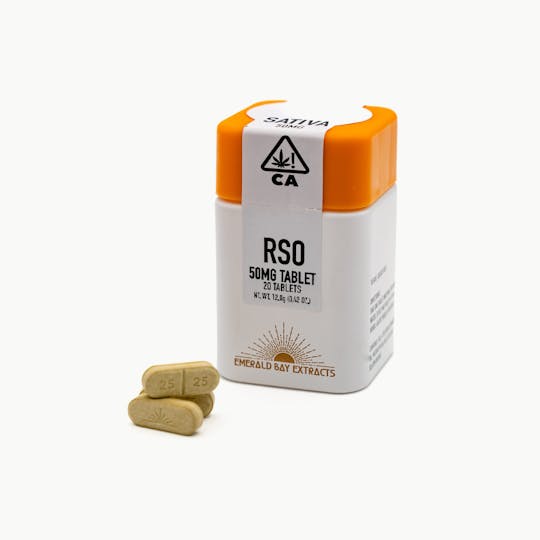
Durban Poison | 50mg Tablet | 1000mg Package | Sativa | RSO
Don’t let the name fool you! Often called the “coffee of cannabis” - Durban Poison is a native South African landrace strain well known for its potent and deep-rooted relief. The OG seed is full sativa with high THC, and has yet to be tainted by extensive cross breeding. An excellent pairing for your morning cuppa, or substitute for a wake and bake session. Best for daytime use, this strain is low in CBD and designed for productivity and creativity. Reported to help symptoms of pain, headache, nausea and depression.
- Earthy
- Woody
- Spicy/Herbal
Emerald Bay Extracts was founded in 2017 by Stanford oncology and ICU nurse, Casey, and her husband Thomas. Casey saw a need to improve quality of life in her patients suffering from chronic pain, tremors and chemotherapy-induced nausea. While in treatment, Casey noticed that some of her patients were self-prescribing cannabis to mitigate the side effects of chemotherapy. After visiting a number of dispensaries, Casey realized there was little information and even fewer options to guide patients and caregivers in their journey with cannabis.
We prepare full-spectrum Rick Simpson Oil into syringes and tablets for oral consumption. Our products allow for specific dosages required by many medical patients. All of our products are strain-specific with indica, sativa, CBD, CBG and various hybrids. Using a science-based approach, we tailor our products for individuals with a range of symptoms, ailments and conditions.
Emerald Bay Extracts develops RSO products using pesticide-free, heavy metal-free, and microbial-free, triple-tested cannabis plants. Flower is hand-selected from small-batch farms in Mendocino, Humboldt and across the Sierra Nevada Foothills. Material is tested by SC Labs before entering our facility, and two more times before reaching the consumer. Our full-spectrum RSO is then packaged into 1 gram syringes, as well as 10mg, 25mg, 50mg tablets.
We truly believe that knowledge is power! Providing unparalleled customer education and support, clean, potent products and in-depth retailer training has allowed Emerald Bay Extracts to gain the confidence and trust of novice and experienced users alike. We pride ourselves on building a brand that patients believe in. We open lines of communication with our retailers and clients to learn what works for them and provide the most benefits!
Durban Poison has deep roots in the Sativa landrace gene pool. The strain’s historic phenotypes were first noticed in the late 1970s by one of America’s first International strain hunters, Ed Rosenthal. According to cultivation legend, Rosenthal was in South Africa in search of new genetics and ran across a fast flowering strain in the port city of Durban. After arriving home in the U.S., Rosenthal conducted his own selective breeding process on his recently imported seeds, then begin sharing. Rosenthal gave Mel Frank some of his new South African seeds, and the rest was cannabis history.
Frank, who wrote the “Marijuana Grower’s Guide Deluxe" in 1978, modified the gene pool to increase resin content and decrease the flowering time. In search of a short-season varietal that could hit full maturation on the U.S. East Coast, Frank’s crossbreeding efforts resulted in two distinct phenotypes, the “A” line and “B” line. The plant from Frank’s “A” line became today’s Durban Poison, while the “B” line was handed off to Amsterdam breeder David Watson, also known as “Sam the Skunkman.”
Durban Poison has a dense, compact bud structure that’s typical of landrace Indica varieties, but the flowers’ elongated and conical shape is more characteristic of a Sativa.

